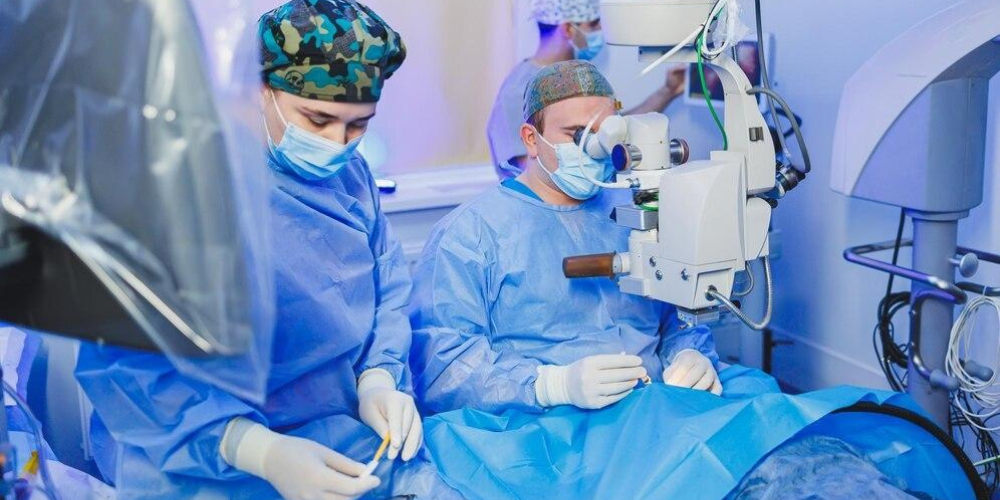
What Are the Disadvantages of Cataract Surgery?

Cataract surgery is a widely recognized procedure designed to improve vision by removing a cloudy lens and replacing it with a clear intraocular lens (IOL). Despite its high success rate and overall safety, it’s important to acknowledge that cataract surgery comes with its own set of disadvantages and risks. Understanding what are the disadvantages of cataract surgery is crucial for making a well-informed decision.
Understanding Cataract Surgery and Its Purpose

Freepik | pikisuperstar | The main aim of cataract surgery is to clear the clouded lens impairing vision.
The primary goal of cataract surgery is to remove the clouded lens that causes vision impairment. Cataracts can make your vision appear blurry, foggy, or less vibrant, affecting your ability to perform daily tasks. The only effective way to treat cataracts is through surgery. However, it’s crucial to be aware of the risks associated with this procedure before proceeding.
What Are the Disadvantages of Cataract Surgery
While cataract surgery is highly effective, there are several potential risks and disadvantages to consider:
- Risk of Infection – As with any surgical procedure, there is a risk of infection. Although rare, an infection in the eye can be severe and may require additional treatment, such as antibiotics or even further surgery.
- Bleeding – Bleeding inside the eye, known as intraocular hemorrhage, is another possible complication. This condition is uncommon but can lead to further vision problems if not treated promptly.
- Swelling – Swelling of the eye’s front part (corneal edema) or the retina (cystoid macular edema) can occur after surgery. While this swelling usually resolves on its own, it may require medication to reduce inflammation.
- Retinal Detachment – This is a rare but serious complication in which the retina peels away from the back of the eye. If not treated immediately, this condition can lead to permanent vision loss.
- Vision Problems Post-Surgery – Some patients may experience blurred vision, seeing halos, glare, or dark shadows after surgery. These visual disturbances can be temporary or, in some cases, may persist, requiring further medical attention.
- Displacement of the IOL – The artificial lens implanted during cataract surgery can sometimes shift out of place, leading to vision issues. In such cases, additional surgery may be needed to reposition the lens.
Posterior Capsular Opacification (PCO) and Its Impact
One of the most common postoperative complications is posterior capsular opacification (PCO), often referred to as a “secondary cataract.” This occurs when the posterior capsule, the membrane that holds the IOL in place, becomes cloudy after the eye has healed. This cloudiness can cause vision to become blurry again, similar to the original cataract.
If you experience PCO, your ophthalmologist may recommend a laser procedure called a YAG laser capsulotomy. This procedure creates an opening in the cloudy capsule, restoring clear vision. Although effective, this is an additional procedure that some patients may find inconvenient.
Recovery Period and Post-Surgical Care
The recovery period following cataract surgery can vary from person to person. During the days and weeks after surgery, it’s important to follow your doctor’s instructions carefully:
- Eye Drops – You will likely need to use prescribed eye drops to prevent infection and reduce swelling.
- Avoiding Certain Activities – You should avoid rubbing or pressing on your eye and protect it from water or soap. Additionally, your doctor may recommend wearing a protective eye shield when sleeping and advise on when it’s safe to resume activities like exercise and driving.

Freepik | During recovery from cataract surgery, you’ll likely use prescribed eye drops to prevent infection.
Financial Considerations
Cataract surgery costs can vary depending on several factors, including the type of IOL selected and your insurance coverage. Medicare typically covers the cost of cataract surgery if your vision tests at a certain level of acuity. However, private insurance plans may have different requirements, and you may still incur out-of-pocket expenses.
If you opt for premium IOLs, such as those that correct astigmatism or offer multifocal capabilities, these lenses may come with additional costs. It’s essential to discuss the financial implications with your ophthalmologist to understand what costs you may need to cover.
For individuals without insurance coverage, payment plans through the doctor’s office or employer-offered flexible spending accounts may help manage the costs. Exploring these options before surgery can alleviate some of the financial burdens associated with the procedure.
Is Cataract Surgery Right for You?
Cataract surgery offers a significant improvement in vision for most patients, but it’s not without its drawbacks. Being informed about the disadvantages of cataract surgery ensures that you enter the process with realistic expectations and are prepared to address any potential complications that may arise.
If you’re considering cataract surgery, it’s essential to have a detailed discussion with your ophthalmologist about the risks, benefits, and costs. This will help you make the best decision for your eye health and overall well-being.
More in Medical Conditions
-
Hematoma vs Bruise: What Is the Difference?
When it comes to injuries, hematoma vs bruise are often used interchangeably, but they refer to different medical conditions. Understanding the...
June 12, 2024 -
What Is Unipolar Depression? Here’s What You Need to Know Right Now
Depression casts a long shadow over many lives, with symptoms that affect everything from our energy levels to our ability to...
June 7, 2024 -
A Comprehensive Guide on How to Heal Anxious Attachment Style
If you often find yourself seeking constant reassurance from your partner or requiring endless validation to feel secure, you may be...
June 1, 2024 -
Why Is My Skin Peeling on My Face After Skincare? Here’s What You Need to Know
Experiencing skin peeling on your face after implementing a skincare routine can be perplexing and frustrating. This phenomenon, where the skin...
May 23, 2024 -
What Is a Mental Edge, and How Do You Get It?
Have you ever wondered why some individuals seem unshakably confident under intense pressure, finding a way to excel when it matters...
May 15, 2024 -
When to Worry About Varicose Veins? Here’s What You Need to Know
Varicose veins are a common issue, affecting about 20% of adults. They’re usually seen as unsightly blemishes on the legs but...
May 12, 2024 -
Why Is Discipline Important: The Ultimate Guide to the Importance of Discipline
Discipline is undoubtedly one of life’s most crucial character traits. It shapes how we approach tasks, manage our time, and...
May 3, 2024 -
Have I Fallen Out of Love or Am I Depressed? Everything You Need to Know
Have I fallen out of love or am I depressed? You’re not alone in this query. In the diversity of human...
April 26, 2024 -
What Does Lung Cancer Breath Smell Like?
Cancer is one of the most formidable diseases of our time, characterized by the uncontrolled growth of cells that invade and...
April 20, 2024















You must be logged in to post a comment Login